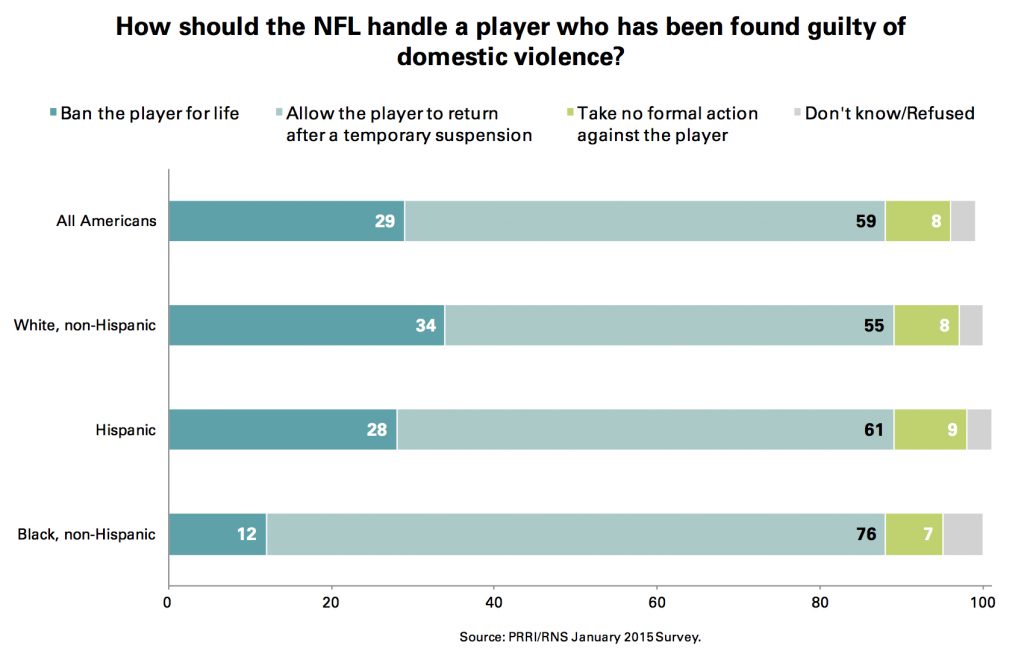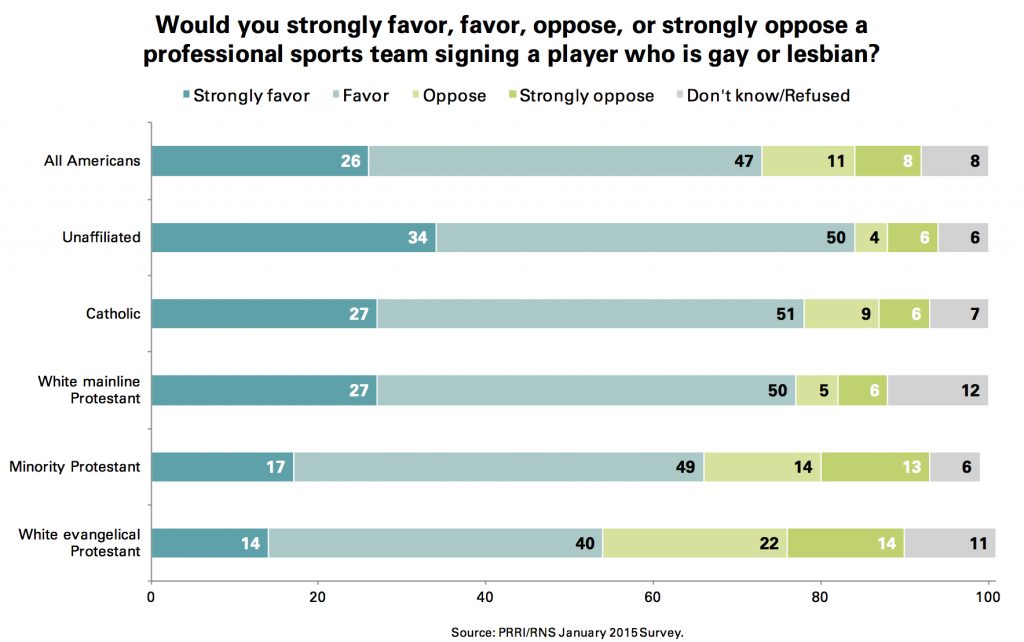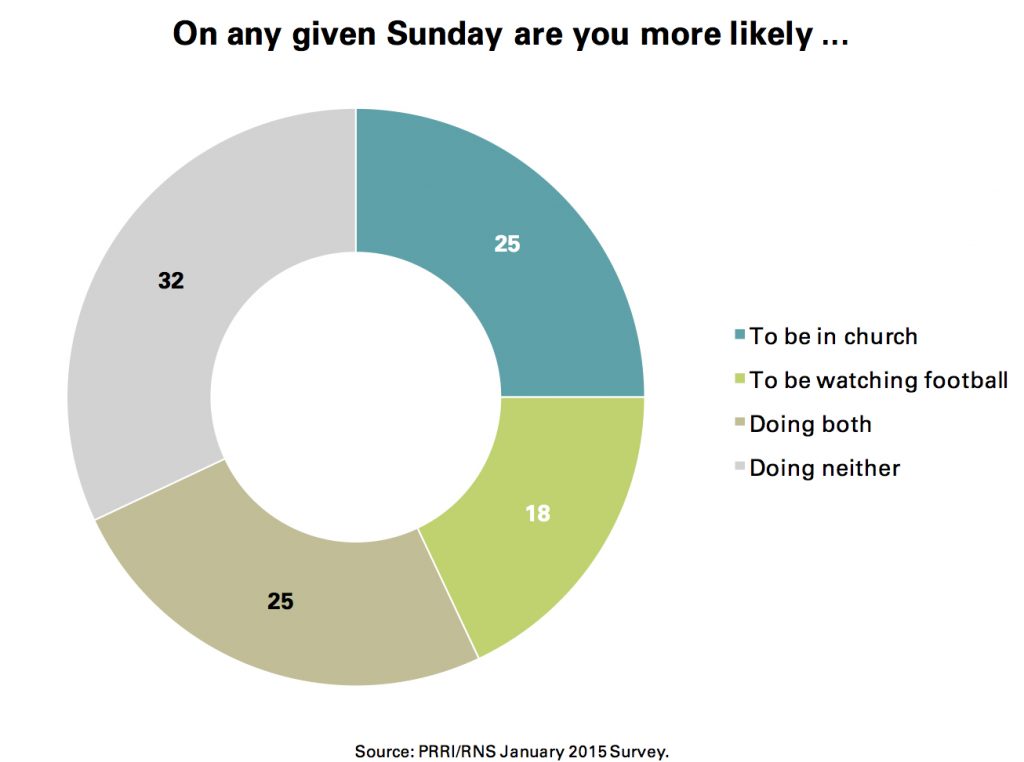I. Professional Sports and Domestic Violence
How the NFL Should Deal with Players Found Guilty of Domestic Violence
Nearly one-in-three Americans (29%) say that a football player who has been found guilty of domestic violence should be permanently banned from playing in the NFL. Nearly 6-in-10 (59%) Americans say that a player who has been found guilty of domestic violence should be temporarily suspended but allowed to return. Nearly 1-in-10 (8%) Americans say the NFL should take no formal action against such a player.
Although there are no statistically significant differences between sports fans’ and non-sports fans’ support for a permanent ban for players convicted of domestic violence (28% vs. 32%), there are notable differences among sports fans by gender. Thirty-six percent of female sports fans support banning a player from the NFL for life, compared to 21% of male sports fans.
There are sizable differences in views by race and ethnicity. More than one-third (34%) of white Americans and 28% of Hispanic Americans favor a lifetime ban for football players found guilty of domestic violence, while majorities of each group (55% and 61%) favor a temporary suspension. In contrast, only 12% of black Americans support the NFL banning such players, while 76% say players should face a temporary suspension.
There are modest differences among most religious groups on the topic. Nearly 4-in-10 (39%) white evangelical Protestants favor a permanent ban for football players who are found guilty of domestic violence, while 31% of white mainline Protestants, 30% of Catholics, and 31% of the religiously unaffiliated say the same. Minority Protestants stand out as the least likely to favor a permanent ban for such players (17%) and the most likely to support allowing the player to return after a temporary suspension (71%).
Signing a Player Previously Convicted of Domestic Violence
Roughly two-thirds (64%) of Americans say they would oppose a professional sports team signing a player who was convicted of domestic violence but not facing any current legal trouble. Three-in-10 (30%) Americans support a team signing such a player. Sports fans’ attitudes (65% oppose, 31% favor) about the signing practices of their favorite teams are not significantly different from the general population. (Note: self-identified sports fans were asked about whether they would favor or oppose their favorite team taking this action).
Men are slightly more likely than women to express support for a professional sports team signing a player found guilty of domestic violence (36% vs. 26%).
Nearly 7-in-10 (69%) white Americans oppose a team signing a player convicted of domestic violence but who has no current legal difficulties, compared to 56% of black Americans and 54% of Hispanic Americans. Approximately 4-in-10 black Americans (38%) and Hispanic Americans (41%) would favor signing a player convicted of domestic violence, compared to 26% of white Americans.
There are only modest differences among religious groups on this issue.
II. Gay and Lesbian Athletes in Professional Sports
Discrimination against Gay and Lesbian Athletes in Professional Sports
A majority (56%) of Americans say that gay and lesbian athletes face a lot of discrimination in professional sports, compared to 32% who say they face a little discrimination and 9% who say they do not face any discrimination.
There are no significant differences by race, gender, or region on this question. However, less than half (45%) of seniors (age 65 and older) say gay and lesbian athletes face a lot of discrimination in professional sports, compared to majorities of all other age groups. Republicans (43%) are also less likely than independents (60%) or Democrats (65%) to say that professional gay and lesbian athletes face a lot of discrimination.
White evangelical Protestants are less likely than all other religious groups to believe that gay and lesbian professional athletes face a lot of discrimination. Forty percent of white evangelical Protestants say they face a lot of discrimination, 44% say they face a little discrimination, and 11% say they face none at all. Majorities of white mainline Protestants (64%), minority Protestants (60%), Catholics (59%), and the religiously unaffiliated (58%) say gay and lesbian athletes face a lot of discrimination in professional sports.
Signing a Gay or Lesbian Player
Roughly three-quarters (73%) of Americans say they would support a professional sports team signing a gay or lesbian athlete, while about 1-in-5 (19%) say they would oppose this action. There is broad support for a professional sports team signing a gay or lesbian athlete across demographic and political groups, including 66% of Republicans, 75% of independents, and 79% of Democrats.
A majority of all religious groups would support a professional sports team signing a gay or lesbian athlete, although white evangelical Protestants register lower levels of support. Roughly 8-in-10 white mainline Protestants (77%), Catholics (78%), minority Protestants (66%), and the religiously unaffiliated (84%) favor teams signing gay and lesbian athletes. In contrast, a significantly smaller majority (54%) of white evangelical Protestants say they would favor a team signing a gay or lesbian athlete, while 36% would oppose such a move.
III. Sports and Religion
On Any Given Sunday…
On any given Sunday, 25% of Americans say they are more likely to be in church than watching football, while 18% say the opposite—that they are more likely to watching football than to be in church. One-quarter (25%) of Americans say that on any given Sunday they are likely to be doing both, while 32% say are not likely to be doing either.
Men are more likely to be watching football than to be in church (24% vs. 17%), while women are more likely to be in church (32% vs. 13%). Roughly equal numbers of men and women report they are likely to be doing both (25% vs. 25%) or neither (33% vs. 31%). Notably, younger Americans are more likely than older Americans to report they would neither be in church nor watching football. Four-in-ten (40%) Americans under 30 and 35% of 30- to 49- year-old Americans say they are likely to be doing neither activity, compared to about one-quarter of 50- to 64- year-old Americans (26%) and seniors (26%).
Nearly half (45%) of white evangelical Protestants say they are more likely to be in church than watching football on any given Sunday, while only 6% say the opposite. About one-third (32%) of white evangelical Protestants say they would be doing both, and 17% say they would be doing neither. Catholics are also more likely to say they would be in church (30%) than to say they would be watching football (20%), but equal numbers say they would be doing both (25%) or neither (25%). In contrast, white mainline Protestants are as likely to say they would be watching football (21%) as to say they would be in church (23%) on Sundays. Twenty-three percent of white mainline Protestants say they are likely to be doing both and 33% say they are likely to be doing neither.
Minority Protestants are more likely than any other religious group to report that they are likely to both be in church and watching football. Among minority Protestants, 32% report they are more likely to be in church, 11% say they are more likely to be watching football, and 43% say they would be doing both; only 15% of minority Protestants report they would be doing neither activity. Only 6% of religiously unaffiliated Americans say that on any given Sunday they are more likely to be in church, compared to one-quarter (25%) who say they are more likely to be watching football. About 1-in-10 (9%) of the religiously unaffiliated say they are likely to be doing both and 60% say they are likely to be doing neither.
The Hand of God in Sports
Majorities of Americans (53%) and sports fans (56%) say that God rewards athletes who have faith with good health and success; more than 4-in-10 of Americans (45%) and sports fans (42%) disagree.
Roughly two-thirds of Catholics (65%) and minority Protestants (68%) say that God rewards faithful athletes with good health and success. Six-in-ten (60%) white evangelical Protestants and nearly half (49%) of white mainline Protestants also believe faithful athletes are rewarded. By contrast, only 27% of the religiously unaffiliated believe athletes with faith are rewarded, while 71% disagree.
About 1-in-4 (26%) Americans and 27% of self-described sports fans say that God plays a role in determining which team wins a sporting event. About 7-in-10 Americans (71%) and sports fans (69%) disagree.
Minority Protestants (45%) are more likely than any other religious group to believe that God plays a role in determining which team wins a sporting event. More than 3-in-10 white evangelical Protestants (32%) and Catholics (31%) believe that God plays a role in determining which team wins a game. Only about 1-in-5 (19%) white mainline Protestants and 9% of the religiously unaffiliated believe God has a hand in the outcome of sporting events.
IV. Football Fandom—And Perceptions of Football as a Dangerous Sport
Americans are more likely to say football is their favorite sport to watch. Four-in-ten (40%) Americans say football is their favorite sport to watch, followed by basketball (12%), baseball (11%), and soccer (8%). Among Americans who say they are fans of a particular team, nearly half (49%) say football is their favorite sport.
That said, about two-thirds (65%) of Americans believe that football is generally more dangerous than other sports; roughly one-third (34%) of the public disagrees. Views about football are generally consistent across a variety of demographic, religious and political groups
At the same time, roughly three-quarters (76%) of Americans say that if they had a young son they would allow him to play football; only 22% would not allow him to play. There are no significant differences by gender—both men and women are about equally as likely to say they would allow their son play football (78% vs. 74%)
There are important generational differences on this topic. Young adults (age 18-29) are more likely than seniors (age 65 and older) to say they would allow their son to play football (87% vs. 59%).
Recommended citation:
Jones, Robert P., and Daniel Cox. “Nearly One-in-Three Support Lifetime Ban for Football Players Who Commit Domestic Violence.” PRRI. 2015. http://www.prri.org/research/prri-rns-ahead-of-super-bowl-nearly-three-in-ten-americans-support-lifetime-ban-for-football-players-who-commit-domestic-violence/.





